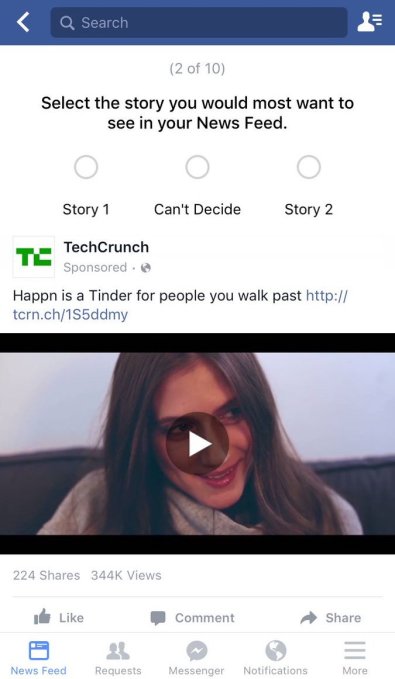Social Media
Facebook changes algorithm to promote worthwhile & close friend content

Facebook is updating the News Feed ranking algorithm to incorporate data from surveys about who you say are your closest friends and which links you find most worthwhile. Today Facebook announced it’s trained new classifiers based on patterns linking these surveys with usage data so it can better predict what to show in the News Feed. The change could hurt Pages that share click-bait and preference those sharing content that makes people feel satisfied afterwards.
For close friends, Facebook surveyed users about which people they were closest too. It then detected how this matches up with who you are tagged in photos with, constantly interact with, like the same post and check in to the same places as, and more. That way if it recognizes those signals about other people’s friendships, it can be confident those are someone’s closest friends they’ll want to see the most of. You won’t see more friend content in total, but more from your best pals instead of distant acquaintances.


A Facebook News Feed survey from 2016, shared by Varsha Sharma
For worthwhile content, Facebook conducted surveys via news feed to find out which links people said were good uses of their time. Facebook then detected which types of link posts, which publishers, and how much engagement the posts got and matched that to survey results. This then lets it determine that if a post has a simialr style and engagement level, it’s likely to be worthwhile and should be ranked higher in the feed.
The change aligns with CEO Mark Zuckerberg’s recent comments declaring that Facebook’s goal isn’t total time spent, but time well spent with meaningful content you feel good about. Most recently, that push has been about demoting unsafe content. Last month Facebook changed the algorithm to minimize clickbait and links to crappy ad-filled sites that receive a disproportionately high amount of their traffic from Facebook. It cracked down on unoriginality by hiding videos ripped off from other creators, and began levying harsher demotions to repeat violators of its policies. And it began to decrease the distribution of “borderline content” on Facebook and Instagram that comes close to but doesn’t technically break its rules.
While many assume Facebook just juices News Feed to be as addictive in the short-term as possible to keep us glued to the screen and viewing ads, that would actually be ruinous for its long-term business. If users leave the feed feeling exhausted, confused, and unfulfilled, they won’t come back. Facebook’s already had trouble with users ditching its text-heavy News Feed for more visual apps like Instagram (which it luckily bought) and Snapchat (which it tried to). While demoting click-bait and viral content might decrease total usage time today, it could preserve Facebook’s money-making ability for the future while also helping to rot our brains a little less.
-

 Entertainment6 days ago
Entertainment6 days agoEarth’s mini moon could be a chunk of the big moon, scientists say
-

 Entertainment7 days ago
Entertainment7 days agoThe space station is leaking. Why it hasn’t imperiled the mission.
-

 Entertainment5 days ago
Entertainment5 days ago‘Dune: Prophecy’ review: The Bene Gesserit shine in this sci-fi showstopper
-

 Entertainment5 days ago
Entertainment5 days agoBlack Friday 2024: The greatest early deals in Australia – live now
-

 Entertainment4 days ago
Entertainment4 days agoHow to watch ‘Smile 2’ at home: When is it streaming?
-

 Entertainment3 days ago
Entertainment3 days ago‘Wicked’ review: Ariana Grande and Cynthia Erivo aspire to movie musical magic
-

 Entertainment2 days ago
Entertainment2 days agoA24 is selling chocolate now. But what would their films actually taste like?
-

 Entertainment3 days ago
Entertainment3 days agoNew teen video-viewing guidelines: What you should know
















